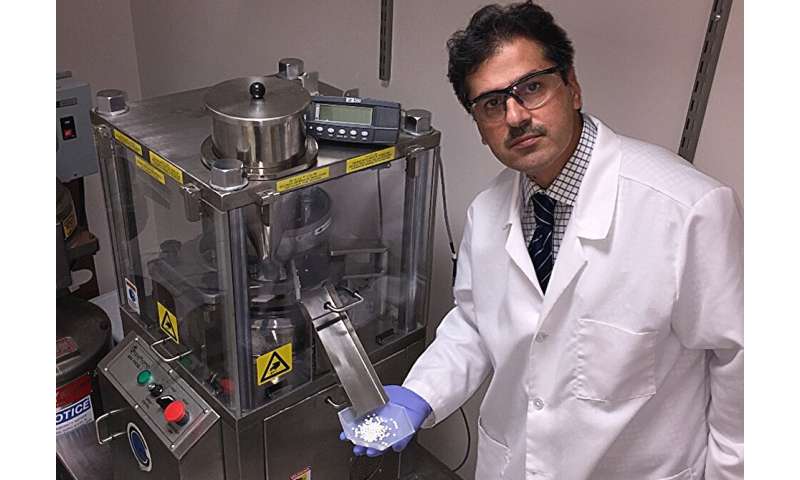Toxic-treating pill developed by Sharjah University scientist

A University of Sharjah scientist has devised the formulation and manufacturing techniques to cure poisoning by pesticides and chemical weapons.
Intended to initiate treatment until patients are transferred to a hospital, the pill is an alternative, patient-friendly and more affordable drug formulation than the currently used injections, said Professor Mutasem (Mark) Rawas-Qalaji, head of department of pharmaceutics and pharmaceutical technology at the university.
Currently, the only out-of-hospital antidote for toxicity resulting from widely used pesticides in farming and warfare gases is multiple injections of a drug known as Atropine sulfate (AS) using AS auto-injectors, he adds.
The AS auto-injector, as antidote, is an approved treatment of organophosphates toxicities—human made chemicals which are most widely used as insecticides by farmers across the world.
Organophosphates (OP) are cheap and affordable to low-income farmers who use them extensively in agriculture, gardens, veterinary practices and even homes.
Prof. Rawas-Qalaji has published widely on OP toxicity and other forms of chemical poisoning.
The auto-injectors of AS's, says Prof. Rawas-Qalaji, are only available for military use and their use requires the administration of "multiple" auto-injectors.
The lead author of a seminal research paper in the International Journal of Pharmaceutics published in 2021, Prof. Rawas-Qalaji provides details on the composition, formulation, and manufacturing of his new drug.
The pill, which he has called "Fast-Disintegrating Sublingual Atropine Tablet" or FDST, has been the topic of doctoral dissertations and numerous academic journal articles.
Prof. Rawas-Qalaji has patented the invention after it successfully passed pre-clinical experiments the results of which he has published in leading academic journals.
He says he has in place the formulation and necessary manufacturing technique required for clinical studies, which are to be conducted before American or European drug regulatory agencies give the drug the go ahead.
Since he first published his series of academic papers in 2006 and 2007 about his novel sublingual formulation for the treatment of various emergency medical conditions, there has been a stream of academic research using his formulation and manufacturing techniques as a starting point, boosting his findings.
He obtained his firsts patents from the European and Spanish patent offices in 2019 and 2020. "American and Canadian patent applications are still pending," Prof. Rawas-Qalaji says.
He is upbeat about the significance of "these novel AS FDSTs experiments" and believes that his invention has the potential to be used as a good alternative "easily administered dosage" for OP toxicity treatment.
In academic research, Prof. Rawas-Qalaji's invention is "adopted … as a starting point for the development of AS FDSTs," writes Dr. Alhussain Aodah in a published Ph.D. dissertation submitted to the Nova Southeastern University in Florida, the United States, in 2017.
"Academic research has proved the feasibility of FDST as a potential dosage form to treat OP toxicity," says Prof. Rawas-Qalaji.
Statistics cited in academic research estimate millions of pesticide poisoning cases worldwide "including around 11,000 fatalities" per year, according to Prof. Wolfgang Boedeker, from Germany's Institut für Arbeit und Gesundheit (Institute for Work and Health).
"Based on a worldwide farming population of approximately 860 million this means that about 44% of farmers are poisoned by pesticides every year" reveals Prof. Boedeker in his widely cited paper titled "The global distribution of acute unintentional pesticide poisoning: estimations based on a systematic review."
Prof. Rawas-Qalaji's research has shown that his pill also has the potential to provide a good alternative to current injectable formulation during warfare when both civilian and military suffer from chemical weapons with OP or nerve agents like sarin.
The use of chemical weapons in warfare is prohibited under international law, but the United Nations has confirmed their deployment in the war in Syria and the 1980-1988 Iraq-Iran war, killing thousands of civilians.
Prof. Rawas-Qalaji's tablet has the potential as being effective in treating hypersalivation or excessive salivation (drooling), which is a medical condition that has no approved orally administered drug in the market yet.
"The tablet will break up in less than 10 seconds without the need for water and immediately release the drug to be absorbed from the sublingual area to go directly to the systemic circulation, which makes them suitable for the treatment of emergency conditions," said Dr. Mark Rawas Qalaji, the inventor of the drug.
"These tablets provide more convenient and rapid access for the treatment of two different medical conditions".
Currently, scientists are completing more animal studies to allow for licensing by international pharmaceutical companies to pursue clinical studies and receive funding for the mass production of the tablet.
"I am confident with the level of know-how that we have gained in translational research and product development over years, we are capable of pursuing such ambitious goal once efforts are united to achieve such goals," adds Prof. Rawas-Qalaji.
More information:
Mutasem Rawas-Qalaji et al, Modulation of the sublingual microenvironment and pH-dependent transport pathways to enhance atropine sulfate permeability for the treatment of organophosphates poisoning, International Journal of Pharmaceutics (2021). DOI: 10.1016/j.ijpharm.2021.120898
Provided by University of Sharjah